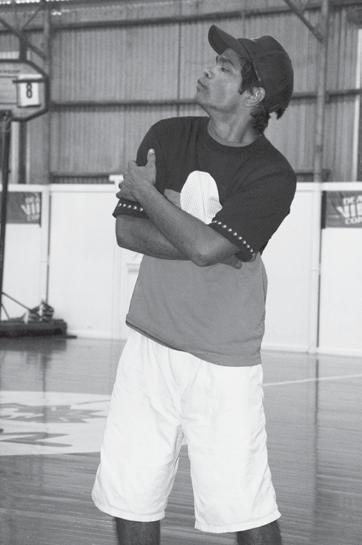
6 minute read
First Aboriginal Rhodes scholar
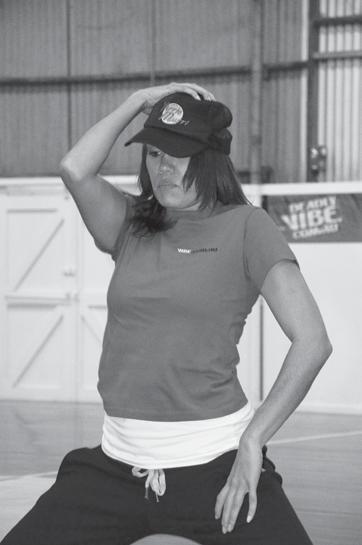
Above: Breakdancer Jason Campbell. Above: Dancer Medika Thorpe.
Advertisement
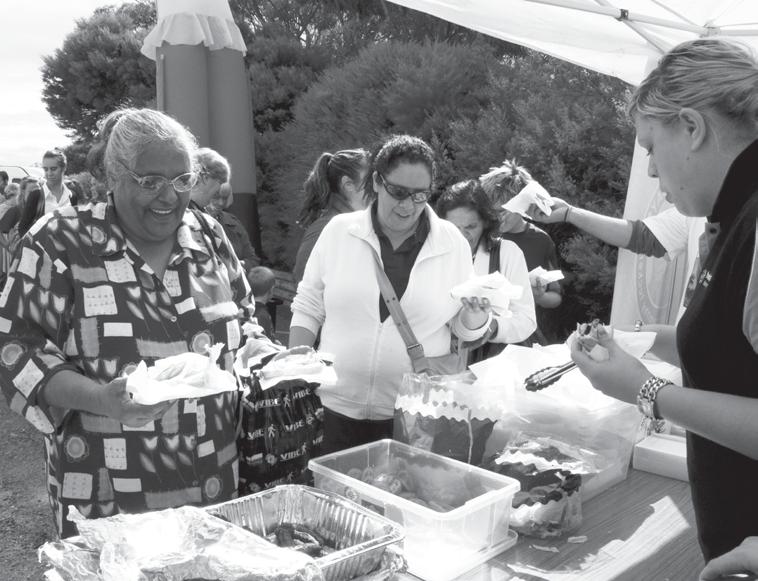
Above: Healthy tucker at the Thumbs Up barbecue.
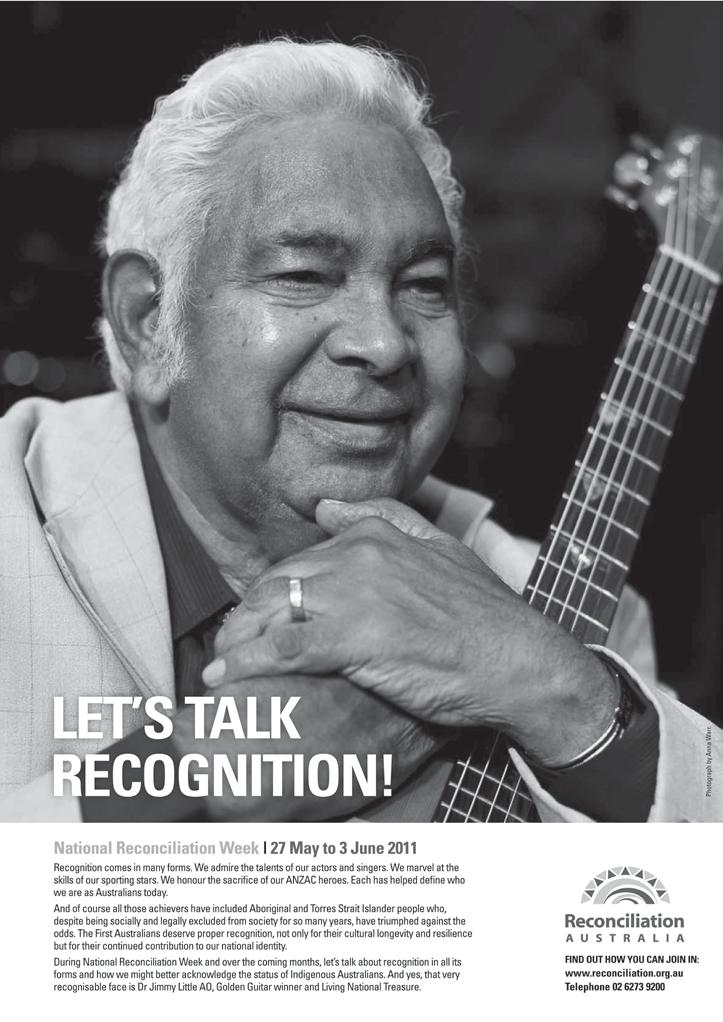
Rebecca is first Aboriginal Rhodes scholar
The first Aboriginal Australian to be awarded a Rhodes scholarship is 23-year-old Rebecca Richards.
Rebecca Richards is a member of the Adnyamathanha and Barngarla peoples of South Australia’s Flinders Ranges, the homeland of her late father Leroy Richards. “This is a great honour, I’m very excited,” Rebecca told Aboriginal Way. Rebecca grew up in South Australia’s Riverland on her family’s fruit block, attending Winkie Primary School and Glossop High School. She has custodial responsibilities for her family site, Pukatu and other women’s sites in the Flinders Ranges. “I am very passionate about native title and about the repatriation of Indigenous objects, languages and associated knowledge to Indigenous communities,” she said.
She said she first became interested in anthropology when at 14, she did some field work in the Flinders Ranges. In September Rebecca will travel to Oxford University to study for a Doctor of Philosophy in Material Anthropology and Museum Ethnography. “The study at Oxford will open up my opportunities. I will be recognised as an anthropologist not just in Australia, but internationally. “That’s very exciting. After studying anthropology at the University of Adelaide, she is now an Indigenous cadet project officer with the National Museum of Australia.
The Rhodes Scholarship is an international postgraduate award for study at Oxford University. It is considered the most prestigious scholarship in the world and was named after Cecil Rhodes. It is awarded on the basis of academic achievement and strength of character. Some other notable Australians who have been awarded the scholarship include Bob Hawke, Kim Beazley, Malcolm Turnbull, Tony Abbott, Geoffrey Robertson and Howard Florey.

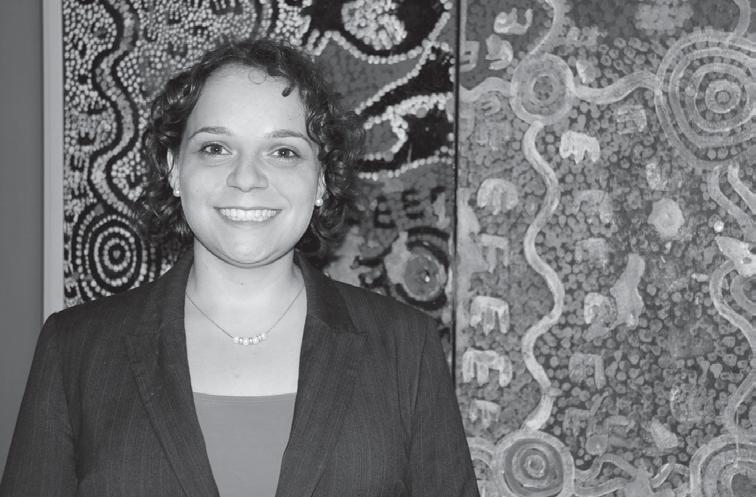
SOUTH AUSTRALIAN NATIVE TITLE SERVICES
Level 4 345 King William Street ADELAIDE SA 5000
Editor
Parry Agius
Journalist Lesley Johns
Advertising Enquiries
(08) 8110 2800
Circulation
15,000
If you have any stories of interest to our readers, please address any correspondence to: editor@nativetitlesa.org Aboriginal Way South Australian Native Title Services Level 4 345 King William Street ADELAIDE SA 5000 Ph: 8110 2800 Fax: 8110 2811 FREECALL: 1800 010 360
The Editor has the final decision on all stories and advertising that appear in this publication.
Plans are underway for the return to Australia of 138 ancestral remains belonging to the Torres Strait Islander community.
The remains have been kept within the United Kindgom’s Natural History Museum. Torres Strait Islanders had been seeking their return for many years. Federal Arts Minister Simon Crean welcomed the decision to return to Australia 138 ancestral remains belonging to the Torres Strait Islander community. “This is the single largest return of Torres Strait Islander ancestral remains from an overseas collection and is a great result for the Torres Strait Islander people who have successfully pursued their case with the Natural History Museum,” Mr Crean said. “The return of ancestral remains is extremely important to Aboriginal and Torres Strait Islander people. The Australian Government is committed to assisting communities consult, plan and negotiate the repatriation of remains residing in overseas collections through the International Repatriation Program. “The Australian Government recognises that repatriation is a key step towards restoring dignity and closing the gap between all Australians. I would like to thank the Natural History Museum for agreeing to return the ancestral remains to the Torres Strait Islander community. “The Australian Labour Government’s preparation for this return of Torres Strait Islander remains began 18 months ago, firstly through a working group of traditional owners in the Torres Strait Island, and then through formal negotiations led by the Department of Families, Housing, Community Services and Indigenous Affairs. “I want to acknowledge the earlier work of my Cabinet colleague Jenny Macklin. We have been working actively to deliver this result. It is proof that persistence pays off,” Mr Crean said. The Minister for Families, Housing, Community Services and Indigenous Affairs, Jenny Macklin said the Gillard Government was committed to the unconditional return of Indigenous remains from overseas countries and institutions.
“We believe repatriation must be culturally appropriate, unconditional and inclusive of Indigenous aspirations,” Ms Macklin said. Mr Crean also acknowledged the contribution made by the Australian High Commissioner to the UK, Mr John Dauth AO LVO, in achieving this result. The Museum, the Torres Strait Islander community and the Australian Government are now working together on how responsibility for the remains will be transferred.
ILUA numbers top 500
The number of native title agreements being negotiated continues to rise with the registration in April of the nation’s 500th indigenous land use agreement.
The National Native Title Tribunal has now registered more than 500 such agreements across the length and breadth of the country and ILUAs cover more than 15.5 per cent of Australia. Tribunal President Graeme Neate said the increasing number of agreements was evidence that negotiating about native title and land use with Aboriginal and Torres Strait Islander peoples had become part of doing business in Australia. “These agreements reflect the increasing ability of governments, industry and other land users to sit down with Indigenous Australians and negotiate about how that land is used and managed,” he said. “Working together to make decisions about land use gives everybody involved the certainty and security they need while respecting the rights and interests of others.” Indigenous land use agreements (ILUAs) are a tool available to parties under the Native Title Act. They are often used to record the agreement of native title claimants in relation to particular projects or developments (such as mining or community infrastructure) but are also used more generally in the resolution of native title claims or to develop new working relationships between Indigenous Australians and others.
Stay in touch
________________________________________________________ _________________________________Postcode: _____________ Phone: __________________________________________________ Email: __________________________________________________ DX no: __________________________________________________ No of copies: ____________________________________________
Is this an alteration to our current records? Yes No
Would you like to be added to the mailing list? Yes No Would you like to be sent regular information about SANTS? Yes No
ISSUE 44
Native title facts
The National Native Title Tribunal assists people to facilitate timely and effective native title outcomes.
Set up under the Native Title Act 1993, the Tribunal is a federal government agency and is part of the Attorney-General’s portfolio. The Tribunal: • applies the registration test to native title claimant applications • mediates native title claims under the direction of the Federal Court of Australia • provides notification of native title applications and indigenous land use agreements • maintains the Register of Native
Title Claims, the National Native
Title Register and the Register of
Indigenous Land Use Agreements • makes arbitral decisions about some future act matters • negotiates other sorts of agreements, such as indigenous land use agreements. On request, the Tribunal can provide assistance and information to all people involved in the native title process.
This is supported by the Tribunal’s Legal, Research, Geospatial, Library and Operations Policy services. The Tribunal’s principal and WA registries are located in Perth. Registries are also located in Adelaide, Brisbane, Cairns, Melbourne and Sydney. The President is based in Brisbane and the Registrar in Perth. The Tribunal can be contacted on 1800 640 501 (freecall) or at enquiries@nntt.gov.au



